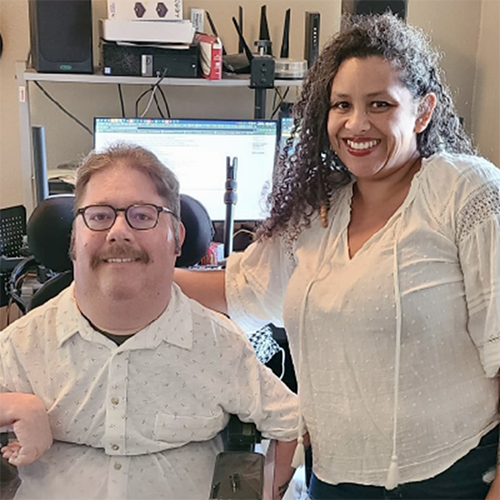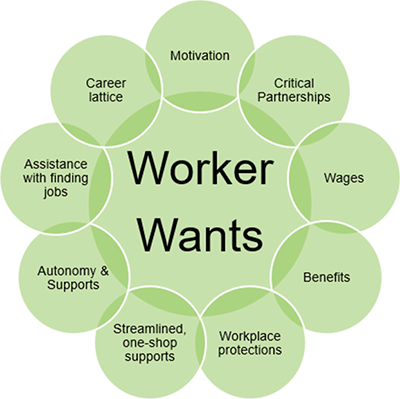The Importance of DSPs
Every day across the nation, Direct Support Professionals (DSPs) play a vital role in America’s workforce and economy by providing necessary supports and services to people with disabilities of all ages, including supports related to employment. DSPs are part of the broader workforce of Direct Care Workers (DCWs).
As skilled professionals, DSPs support people with disabilities to participate in their communities, including through employment. For example, they may serve as job development staff to assist in finding and/or customizing jobs or as job coaches who provide direct employee assistance on the job. They also provide other services, such as help with activities of daily living.
A current nationwide shortage of DCWs, including DSPs, adversely affects not only millions of DSP workers themselves, but also the many people who use or could benefit from their services. Shortages in recent years have spurred federal, state and local action to bring more attention to this profession and mount an effective response to attract more people to become DSPs and support them through appropriate compensation and opportunities for advancement. People with disabilities can be great candidates as DSPs to help address the shortage.

The Role of a DSP
Historically, DSPs primarily served as caregivers for the people they supported. In the past few decades, however, the needs of those served began to change, and the roles of DSPs began to change as well. Today, the role of a DSP goes beyond caregiving and focuses more broadly on supporting people with disabilities to participate fully in their communities, live in integrated settings and seek competitive integrated employment (CIE). Some of the roles of a DSP include:
- Supporting engagement with the community by providing:
- Support in less congregate and more individualized settings
- Job coaching
- Employment support
- Transportation
- Using creative thinking for accommodations to help people with disabilities be more independent
- Providing caregiving and support with activities of daily living, including:
- Medication administration
- Mobility assistance
- Wound care
- Accessing food
- Working with the people they support to Advocate for rights and services, such as:
- Accessing resources and opportunities in the community
- Working with the employer to customize job duties
- Providing emotional support

Professionalizing the DSP Workforce
To better understand effective strategies for supporting and expanding the DSP workforce, ODEP, through the LEAD Center, hosted a DSP “Think Tank” on February 3, 2022. More than 80 individuals, including DSP advocates and experts, participated. The following day, 18 government agencies participated in a listening session summarizing ideas gleaned from the event to help them better understand the important role DSPs play in supporting the employment of disabled people and the consequences of the DSP workforce shortage.
The event covered four main topics:
- Career pathways and training
- Professionalization of DSPs as a distinct occupation
- Enhancing wages and benefits
- Making the direct support profession a career path for people with disabilities
Building on the Think Tank
Adding Value Through Direct Care Work – This blog, written by DSP Aleathea Simmons, a female with a disability, provides insight on the job duties of a DSP. Ms. Simmons reflects on her experiences to illustrate the importance of direct care work in enabling people with disabilities to live and work in their communities and the potential policy solutions that could expand and improve the profession.
DSP Fatimah Howard & Nicholas Smith Share Their Insights – Read about the experiences of two DSPs and why they are committed to their profession.
Training and Career Pathways for DSPs
In 2010, DOL’s Employment and Training Administration (ETA) approved national guidelines for apprenticeship standards for DSPs. These standards enable employers to use ETA's Registered Apprenticeship program to train DSPs in the health care industry’s long-term care sector.
Outside of apprenticeships, job training for DSPs varies widely depending on the position, provider and location. Some employers provide training and/or require certifications. Agencies that manage consumer-directed services, such as in-home support services, may also offer and/or require certain types of skills trainings. Some people with disabilities train their DSPs directly, and several organizations offer their own certification and training programs.
Note: Some of the trainings do have costs attached with them. ODEP does not administer or otherwise have oversight over these organizations or their training programs.
Promising Practices: Examples of DSP Credentialing and Apprenticeship Programs
Additional Resources
Administration for Community Living (ACL) – Part of the U.S. Department of Health and Human Services, ACL’s fundamental principle is that older adults and people of all ages with disabilities should be able to live where they choose, with the people they choose and with the ability to participate fully in their communities. ACL funds a wide range of programs that are managed by states and communities to best meet the needs of people who live there. ACL’s DCW Strategies Center provides resources, technical assistance and training to state systems, providers and stakeholders to improve workforce recruitment, training and retention to workers who provide home and community-based services.
Institute on Community Integration (ICI) – An area of focus for ICI is to ensure that public policy and services are helping people with disabilities live their best lives in their communities. Through applied research, policy advocacy and training, ICI engages with individuals with disabilities, families, providers, policymakers and community members to influence local, state and federal policies, and support individuals with disabilities and their families across their lifespans.
National Alliance on Direct Support Professionals (NADSP) – The mission of NADSP is to elevate the status of DSPs by improving practice standards, promoting system reform and advancing their knowledge, skills and values. The various services and programs offered by NADSP provide professional development opportunities along with the resulting recognition and acknowledgement that these professionals deserve.
